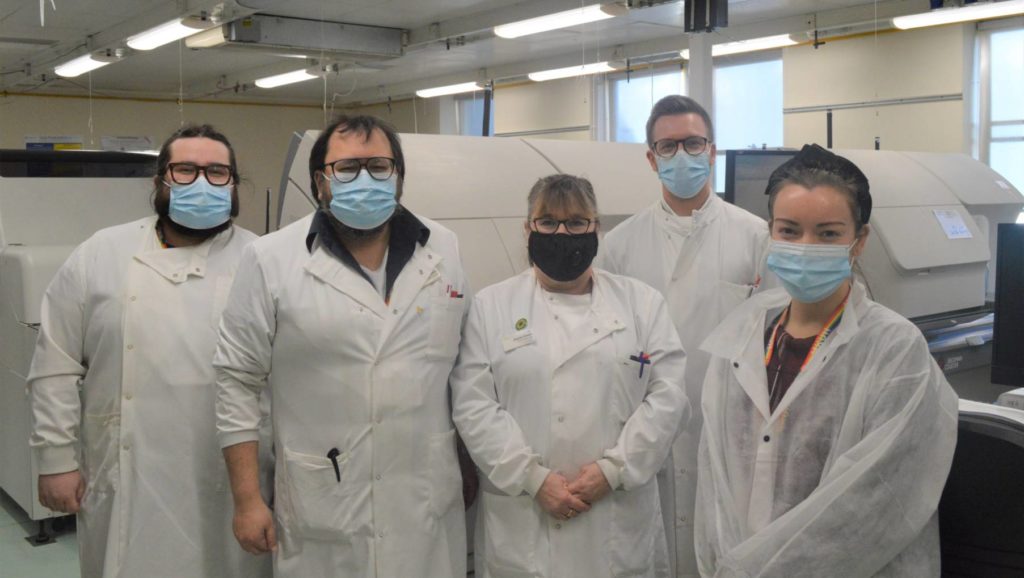Pathology services embraces Kaizen practices to improve urgent patient sample analysis
The Japanese concept of Kaizen – meaning ‘change for better’ or ‘continuous improvement’ – has long been associated with manufacturing organisations, aiming to streamline their processes to reduce unnecessary waste, enhance productivity and improve product outcomes.
The Pathology services department at Milton Keynes University Hospital is the latest to embrace, and benefit from, the principles of Kaizen in attempt to reduce the time it takes to analyse urgent patient samples sent from the Emergency Department. The team has always strived to meet the national targets set by the NHS England and Improvement Pathology Quality Assurance Dashboard and aim to analyse 90% of urgent samples within one hour. The targets are in place to facilitate patient care, ensuring that results are processed and communicated in a timely manner.
Following a number of internal reviews over the last 24 months, it was found that the team were not always consistently meeting this target, with an annual average achievement of 85%. After making several minor service changes during that time, including spending time with other NHS Pathology teams, the department decided that more significant action was required to create longer-term, sustainable change that would enable the team to achieve and exceed the national target by reaching over 95% compliance.
Kaizen was introduced to the department by Beckman Coulter, an organisation that has been supporting the Trust with various services over the last few years. To test and trial what was possible, a small multi-disciplinary team, consisting of colleagues from Haematology, Chemistry, Microbiology and admin services, were established, with each individual keen to support change and introduce quality improvements. The team, led and supported by MKUH Pathology Quality Manager Jessica Dixon, were tasked over three days to use the concepts and principles of Kaizen to analyse the existing sample processes and identify where improvements could be made.
The progress this team achieved in only a matter of days was incredible. Firstly, through making minor tweaks to the process, they managed to detect a 50% reduction in non-value added tasks, which equates to several minutes being shaved off the initial pathway. Secondly, they reduced the number of staff involved in the process of analysing the sample, cutting the number of touch points down from six to two. Those staff still involved in the analysis were then given greater ownership and responsibility over managing the process, improving their skills and increasing their engagement.
These two significant performance outcomes were achieved through introducing several key improvement actions, including:
- Introducing an additional centrifuge (provided free of charge by Beckman Coulter to support the process)
- Moving the centrifugation earlier on in the sample Pathway (in reception)
- Increasing colleague engagement and awareness overall of prioritising urgent patient samples
- Removing unnecessary non-value add tasks and wasted steps from the current pathway, making the process more ‘lean’, productive and sustainable.
From having little to no knowledge of Kaizen practices, the service improvements the multi-disciplinary team had identified was hugely impressive and under the guidance of representatives from Beckman Coulter throughout, they have been able to design solutions that can be relatively quickly rolled-out into the live process.
For the team involved, this journey has been hugely rewarding and an opportunity to use their skills and expertise to make genuine service improvements. The mini-project has enabled colleagues from across different departmental areas to come together, reflect and take a wider look at a process that has largely been unchanged for a number of years – asking the questions that previously may never have been asked.
Oliver Norwood-Grundy, Quality Support and part of the MDT team, said: “It was great to work as a team with individuals I wouldn’t usually have a chance to work with and hear their view on the lab. I learned that is it good to question our processes and find out exactly why each step we do is necessary and, if not, question why we do it.
“There is no use taking the time and effort to do something because that’s just the way it has always been done. I plan to apply this to other processes throughout the lab to take burden away from staff.”
As well as an opportunity to improve their knowledge, all individuals in the team have been empowered by senior management to make decisions and test new ways of working which has boasted their morale and created a general buzz and level of excitement across the whole department. At a time when many other managers may have been wary of releasing team members from their day job to work on such a project due to staff shortages, the Pathology team saw this as an opportunity to improve their service, releasing longer-term pressure on the team.
Jill Beech, Pathology Services Manager, said: “I have been so impressed by what this team has been able to achieve in such a short period of time. It has been fantastic to see their enthusiasm, desire and hunger to learn and apply these principles to the way that we work at MKUH. The ripple effect across the whole team is already evident, with other departmental colleagues excited by the changes that are being introduced.
“The project has been a breath of fresh air for the whole department and I’m looking forward to seeing how these simulated service improvements translate into enhancing the service that we provide to our patients.”
Due to the extraordinary success of the project, the Pathology team have wasted no time introducing some of these process changes and plan to implement a second centrifuge in the coming months. All team members, including those involved in the project, will continue to monitor monthly KPIs to track progress and identify any further improvements in the future.

The Kaizen project team at MKUH
Last Modified: 11:09am 14/02/2022
For all media enquiries please contact [email protected]
